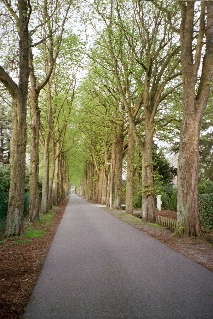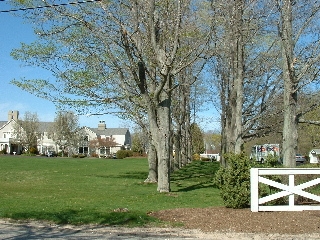Kapelen Belgium Travelogue, 2003 April
This records my trip to Belgium in 2003, staying at the home of my friends Mark and Marc — you can see them and their home here.
chapter 1
Hello friends,
I will try to keep sending these rambling accounts of my trip — feel free to read them when you have time — if I have something specific and more timely to say I'll say it in a separate message.
I will start at the beginning and catch up over time.
Friday 4th April 2003
This morning early I woke up in the airplane, a bit before dawn — I raised the shades and looked out, there was a long thin dim ultrablue curve of the horizon in front of me, just as the astronauts see every hour in the Space Shuttle. The video screen in front of me showed that we were coming up upon the west coast of Ireland, doing just under 900 km/hour with a bit of a head wind.
All concerns of airline mishap or terrorism had gone away. But yesterday afternoon, while we were sitting on the taxiway waiting to get cleared for takeoff, another plane (Continental 1183) reported to ground traffic control that he "had a problem" and that several passengers were concerned because they were hearing "a ticking sound coming from something in the overhead bin". They told us (United 8156) to hold our position while they scrambled several firetrucks and directed CO1183 to a taxiway away from the other aircraft. The pilot reported, "111 souls on board, and 3 hours 13 minutes of fuel" I was one of only a few to hear this; they have air traffic control on one of the headset audio channels but most people don't listen to it. After we were on our way, the pilot got on the loudspeaker and told us that CO1183 had been recalled because some passengers had been "concerned about a piece of carryon luggage".
I think Flemish is one of the most pleasing languages to listen to. Not as harsh as German, more accessible than French. There are enough root words in common with German and English that I have had little difficulty deriving at least part of the meaning of things written in Flemish. When I am stuck, I can also read the French, which is the other principal language of Belgium (although here in the north, Flemish predominates).
On approach and landing I had ample opportunity to survey the geography, organization and architectural styles of the towns and villages in central Belgium. The most striking aspects were the lack of segregation by function (residential, retail, agricultural and industry) and countless small groves of trees planted in rows and columns about 5 meters apart. As I expected, the buildings are all of stone, brick and concrete with the simpler styling that I find somewhat minimalist, and beautiful.
Deplaning and customs were quick, efficient and effortless. As planned, I went directly down to the rail station on the lowest level and got a ticket to Kapellen, the village of my Belgian friends. Two or three trains (depending on timing), 90 minutes, 7,00 E (= $7.35) one-way 2nd class. At the first transfer I lost some money at a pay phone because I did not understand how to dial my friends from within their own country (-:
Of course, the train ride reminded me of the excellent music video "Star Guitar" by Chemical Brothers, so I listened to that track a couple times on my iPod. From the train I could see that the aesthetic minimalism of European design extended to such things as railings, posts, road signs, landscaping, facades and architraves, etc. Most of this I saw in England 12 years ago but took little notice.
At Kapellen I found a newsstand and bought a prepaid phone card, the best way to use a pay phone in Belgium. The pay phones themselves are a bit scarce, apparently only found near rail stations and (I suppose) at hotels or tourist spots. I am told that the pay phones went away with the rise of cellular phones. My friends picked me up, I had fun identifying several of my favorite brands of cars (that are never seen in the U.S.) while waiting.
My friends' house is shown here. If the web page doesn't work, wait an hour or two and try again — sometimes it is unavailable because Tripod limits something called "bandwidth usage". Here is the URL:
I spent most of the rest of this day resting, and talking with my friend Mark.
Saturday 5th April 2003
The elegant simplicity of European houses extends to such things as electric fixtures and windowsills. I am told they don't build with wood because wood is in short supply, but I have to suspect that it's also the result of hundreds of years of wisdom that things should be built to last. In America we still often treat building as did the early settlers, quick and functional.
This house has cobblestone paths, edging and driveway, marble sills and thresholds everywhere, with trim usually only where functionally necessary. I love it.
(to continue in next message)
chapter 2
Saturday 5th April 2003 (continued)
I noticed these things during the early morning hours, when I couldn't sleep for several hours due to the time shift. I ended up spending most of that time working out the interface on the television. My friends have a fairly typical cable service, there are about 30 channels in Flemish, French, English and German. Each channel has its own teletext data. This is the original early 80's European data broadcast system, allowing quick access to news, sports, weather, program listings, etc. Mass-market data broadcast, a very early primitive version of surfing the Internet.
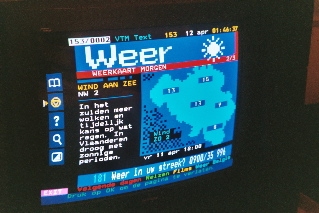
teletext
Today after breakfast we walked the dog together, and I got a chance to see a lot of houses in the neighborhood, with commentary from my friend who has extensive knowledge of architecture and design, and history of the area. This neighborhood (like my own in Scituate) is built out of an old estate, and there are trees planted along some roads that used to be private ways within the grounds of the estate. The most striking examples have two rows of trees on each side of the road, planted at an even spacing of about 3 or 4 meters (called an allée). I recognized that I had seen some of these from the air yesterday morning. They are rare in America but very common in Europe. Often they appear with no road in between the trees, in this case usually a private way used to exist but is gone.
|
|
|
Still quite tired today from jet-lag and also got a bit emotional because of communications problems with my hosts. Mark is the one I knew before this visit, and both have some requests that I need to assimilate and comply with to be a good guest. This is all quite new for me, although I've been a guest before but not in quite such an intense way. My friend Roger has told me that the difficulty results from too much change all at once — the change of language and culture compounded by the change from living by one's own rules to being a guest.
Marc's father Pierre came by in the afternoon with a small trailer hitched to the back of his car to pick up yard waste and other recyclable items. In this town the compost and (non-recyclable) rubbish are picked up by the town, the rest needs to be brought to a central facility (which Marc calls by the rather amusing name "container park"), or in the case of glass, deposited into any of dozens of large green fibreglass bins placed around the town for the purpose.
Sunday 6th April 2003
Today we had dinner with Marc's parents, who live just a short way south of here. Most of Marc's close relatives still live in Kapellen and today I met a sister Madia, brother-in-law Mark and neice Alicia as well as Marc's mother Rosa.
(more to come...)
chapter 3
Sunday 6th April 2003, continued
A lovely house. As we are sitting at the dinner table we are in the back room of the house, where an American house would have a picture window or big sliding glass doors onto the back yard. This house in fact has big glass doors that open onto a patio with plants; this patio is separated by some plants from a small lawn behind it, also landscaped very well; this in turn is separated by some plantings from a slightly larger piece of lawn behind that, and then another barrier defines the beginning of the vegetable garden which extends the rest of the way to a shed in the back of the lot. Each of these five spaces (the room, patio, two lawns, and the vegetable garden) form a gradual and continuous progression from more formal to less formal, from smaller size to larger size, and from front to back. Quite an impressive effect.
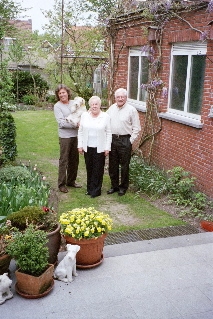
Marc and his parents, in part of the lawn just described
Before dinner we watch a television show called "Royalty" on the local Belgian cable station VTM. This is a weekly show about the Belgian royal family, it keeps everyone up to date on what the king and other prominent members are doing and gives a view of the logistics and other aspects of the real life of public figures. It is a very popular programme and I watch it with about half of the family. (It is all in Flemish so I ask occasionally for commentary from Marc).
Monday, 7th April 2003
Wake up early after odd dreams (I was at Dartmouth again trying to study for an exam, then trying to find my dorm room — common anxiety dreams).
Today we drove up a short way into Holland. The main road (Kapelssestraat) going past the house leads north through a village (Putte) on the border with Holland, then through Hoogerheide to an interchange with the highway A58.
Well, not exactly. In fact what should be an easy 10-minute trip is diverted no less than three times by road construction. There are also several other blockades and detours in the rest of Kapellen, including two of the intersections we would normally use to get from the house onto the main street.
Just on the other side of this we drove to the edge of a wetland that has some grass and wooded areas, sort of a wild park,what might be called a "wildlife sanctuary" in America. There is a row of modern windmills off on the horizon (metal, two blades like a huge airplane propellor, turning slowly) and occasionally a train goes by on its way north towards Rotterdam or out into the peninsula Zuid Beveland. The air is fresh; it is quiet and refreshing. 10 degrees C with little wind, warm enough even for sunbathing. (We are at 51 degrees north latitude, which is 9 degrees north of my own home, but the Gulf Stream makes it warmer than you might otherwise think. Throughout England and Scotland today it was quite a bit warmer).
Tuesday, 8th April 2003
This is the first day I really started to do things on my own since arriving in Kapellen. I had a few errands to run, the first of which (and not the least, as it turned out) was to get a cash advance from my credit card.
This is one of the areas of the world in which a major proportion of the population gets their errands done by bicycle. The roads everywhere are set up for bicycle travel. A few examples:
- Bicycle lanes accompany almost every road — two bike lanes on two-way roads — painted red or paved in red brick. These either take part of the sidewalk or part of the street, depending on available space.
- Almost every "no (left/right) turn" or "do not enter" sign has another sign below that says "except bicycles" (UITZONDEREN and a picture of a bike)
- In large cities like Antwerp, at intersections there are three sets of traffic lights: the familiar sets for cars and for pedestrians, plus a third set for bicycles.
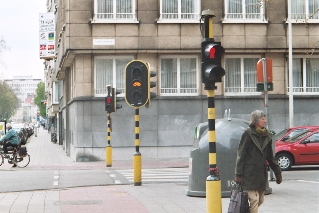
The pedestrian light is red, the bike light is yellow, and the auto light (out of view) is still green
- Bike shop items like a generator, headlight, bell, tyre pump and repair kit can all be had for half the price they would cost in an American bike shop, and are stocked by supermarkets in the hardware/housewares aisle.
Foolishly, I thought that the world financial system had progressed a bit in the 20 years since my trip to Italy and it would no longer be necessary to bring traveller's cheques. My other friends who had gone to Europe recently told me to just get a cash advance on my credit card (with my passport as photo ID) but neglected to tell me that the tellers in Belgium don't know how to do this, and the ATM's require a PIN number which is not used for any other type of credit card transactions and which my credit card issuer neglected to send me.
So I left the bike in one place and spent a while taking a self-unguided walking tour of this little Belgian town finding all the banks to ask if any could either convert some American currency to Euro or do the cash advance. I eventually grew tired of this and put off my errands to tomorrow.
(to be continued)
chapter 4
Wednesday, 9th April 2003
I did some more bike rides today. First I headed back into town hoping to find a bike shop that could sell me the needed part to make the bicycle street-legal in Belgium (a bell to warn pedestrians, and a headlight powered by a generator or batteries, for use at night).
There are three bike shops in Kapellen, but one was closed for the week and the other two did not take credit cards. So I went back to the house and called shops in neighboring towns. I found the shop I needed in the neighboring town of Kalmthout, 10 kilometers to the northeast.
This is the furthest I had yet travelled alone, and I made the trip quite quickly. We are in a huge alluvial plain, they don't call them the "low countries" for nothing. The biggest hill I have seen to date is a motorway overpass berm about 8 meters high. I have good legs and it's a good bike, and the adequate bike paths everywhere make it an effortless and pleasurable activity to ride 12 miles for a small shopping trip.
The bike shop attendant was very friendly and spoke English excellently, and advised me on where I could eat lunch before returning to Kapellen. Alas, the cash problem is still before me, so I decided to ride home and eat lunch with Marc and Mark.
When I am at my own home I enjoy watching the interior design shows on cable — Surprise by Design, Christopher Lowell, Designer's Challenge, etc. My friends here in Belgium are designers, and their favorite design show is something on BBC called "Homefront". There is a landscape designer and an interior designer who work together on a house every week, with no limit to expense. They usually have some good ideas but also do something really wacky. Tonight they were restoring a 1930's contemporary to its original appearance but adding a fancy garden to the back. Everything turned out rather well until they installed an 8-foot-high revolving stainless steel sculpture in the shape of an egg. We joked about how the owners could always just cover it with something.
Thursday, 10th April 2003
It has been rather unseasonably cold these last few days, and today I woke up early to find a light cover of snow on everything. I went out to take some photos knowing it would all be gone soon. Then I worked on the computer for a while on the first installment of this travelogue.
When my friends woke up, we headed out to Kalmthout again to take the dog (a beautiful 8-year-old Fox Terrier named Trix) to the groomer, and then down to Antwerp to have yet another stab at the credit card cash advance problem.
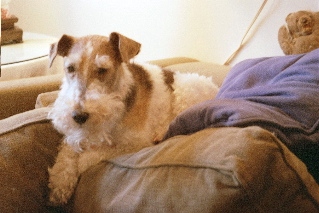
Trix after grooming
I did not bring many wallet cards with me from the United States because I had a case of identity fraud back in 1994 and I have been particularly cautious ever since. For example, an ATM card is risky because someone can watch you dial in your PIN code and then steal the card. So I deliberately counted on using my credit card with a cash advance through a teller interaction (not at the ATM with a PIN code) to get cash while on the trip.
Today I discovered that the process to accomplish this task in Belgium is as follows:
- get two officials of my credit card issuer's bank to assure me it was possible,
- go to the their central branch office in Antwerp,
- get turned down by the teller who says it's not possible,
- have my Belgian friend explain the whole situation in Flemish,
- wait 30 minutes while the teller talks with the Brussels office and gets put on hold by 5 different managers,
- stand in different parts of the lobby while the cleaning service does their work,
- be admitted into the "employees only" area to personally talk with the manager for security verification,
- admire the attractive cleaning man, and
- finally get approval without actually giving my mother's maiden name or anything else that wasn't already on my passport.
Mission accomplished, we returned to Kalmthout to pick up the dog and then had a very nice lunch, prepared as always by Marc who is a very good cook and has been making us very tasty and healthy meals. I have been doing the cleaning because Marc pretty much likes to cook alone.
When a person begins to live in a new social environment, he and his environment adapt over time and that adaptation can be viewed as a progression of stages.
The first stage is often the most difficult. Any fundamental incompatibilities will show themselves and need to be resolved quickly, or the new person must leave the group. This can take a very short time or a very long time depending on the intensity of the interaction; in my case it seems to have lasted about 48 hours.
My hosts and I could not be more different with regards to how we physically organize our lives. They are interior designers, and naturally they like to live in a beautifully designed space. They keep it looking beautiful all the time (otherwise, what's the point) and their style is of the uncluttered sort that is shown in most of the leading design magazines. This involves, among other things, having a place for everything (usually concealed from view) and putting everything in its place, preferably as soon as one is done using it if not sooner. My style, as you might expect, is pretty much on the opposite end of the spectrum — to the extent that I have actually removed all my kitchen cabinet doors so I can always see what's there.
I did not anticipate that this would be such a great challenge: learning the rules of the house to be a good guest, and learning where everything must be put, and cleaning up after oneself so as to make it appear that you were never there (or indeed, that anyone was ever there) turns out to be a bit more than I can handle. I remember a moment when I was stuck in a catch-22: I was given a pair of slippers to wear inside the house, then told where to keep the slippers to hide them from view when not in use, then told that I could not walk on the in that room rug with the slippers on. To get to the place where the slippers are kept you have to walk across the rug. I was in tears, Marc asked Mark what was the problem and my friend replied, "too many rules". Truth be told, on Saturday the 6th I was almost ready to pay the extra money to travel back home immediately so as to minimize the trauma and perhaps keep the friendship. I had it all planned out: I would arise at 4 in the morning, pack very quietly, leave a note and some money to pay for food and gas and then catch the 5:26 train out of Kapellen back to Antwerp and sanity.
Fortunately, human nature and experience intervened. I began to live like them, taking a valuable lesson from my Sterling Institute experience as a course production volunteer and treating them as participants. That meant, my role was to be a servant. I dedicated myself to doing everything my friends did, and before they did it if possible, so as to spare them the effort.
I learned a lot from this. Naturally, people like to be served. It's a good way to smooth over the bumps in a relationship and get things to a more copacetic point from which a more equitable situation can be negotiated — and it keeps ones mind of oneself, very important in any situation where you are suffering. But more importantly for me, it raised my level of alertness and activity and allowed me to actually learn some of what it is like to be my friends.
If you want your house to always look beautiful, it takes time and effort. Maybe before I leave I will conduct a time and motion study of my friends, but right now I would estimate that their efforts to keep their house looking unlived-in take about 6 man-hours a day, or 3 hours a piece.
(Please be warned — I do not intend any offense or bad feeling — and Mark is one of the readers of this travelogue: spending 6 extra hours a day is just fine, if the result is sufficiently important — and for them it clearly is. They seem to derive an intense primal pleasure from living immersed in their unending crytal-clear design aesthetic. I would not suggest they should be deprived of this.)
This is not unfamiliar to many Americans — but I have probably not seen such a thoroughly executed example. Nothing of non-decorative value has ever been left in view for more than a half hour (with the notable exception of a phone book, which early this week sat defiantly on a couch for over a day). The stove, sink and counters are cleaned after every meal, with enough effort to keep them looking as if newly installed. The hardwood floors are vacuumed daily, as are the carpets (in strokes parallel to the wall so all the bristles line up right). If you finish a can of soda, it must be immediately recycled — a task that requires no fewer than 12 separate actions (crush the can; go into the mudroom; close the door to keep the dog in the house; remove your indoor shoes; put on your outdoor shoes; open another door and walk into the garage; put the can in the bag; and then reverse steps 2 through 6). It seems to be unacceptable to wait until there are multiple items to be recycled — each item is carried to the garage individually.
This level of dedication leads to a number of adaptations that I have identified in my friends (after becoming the servant and observing them in myself). Here is what I have seen so far:
- Because of the exceptional level of activity required to accomplish this, one naturallly learns to perform every motion as efficiently as possible. This requires a special kind of mental effort not unlike that of a player on a sports field — coordinating ones actions while constantly thinking ahead to the next action. It produces a sort of mental rush, an intense focus and attention to detail.
- In time, the individuals who have agreed to cooperate in maintaining this lifestyle will begin to act as players on a team. Mark, Marc and I began finishing each others' tasks. Once the details of the task and method of its execution are known and agreed upon, they can be performed more efficently by multiple people. For example, one might help in recycling something if one is also heading outside and happens to see that the item needs to be carried out immediately.
- In order to have everything of functional use hidden from view, you have to remember where everything belongs. A great anount of mental capacity is taken up with learning where things go and where they have been put.
(more to come...)
chapter 5
Thursday, 10th April 2003, continued
As it was Marc's intention to show me some of Antwerp, we went back there after lunch and parked the car under a hotel in the old city. I took a few photos, although my focus is on things I cannot find on the websites and tourism office brochures. In the center of the large square Groet Markt is a statue depicting one of the legends of the city, described by Frommer's guide to Belgium as follows.
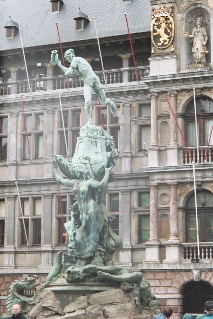
The statue in Groet Markt, Antwerpen
"[Antwerp owes] its name to a giant of ancient days called Druon Antigon. Legend has it that Druon levied exorbitant tolls on every Scheldt boatman who passed his castle, and if anyone would not or could not pay up, the big man gleefully cut off the miscreant's hand and threw it into the river. Druon's comeuppance came from a Roman centurion named Silvius Brabo, who slew the giant and (as if that weren't enough) cut off his hand and threw it into the river, thus avenging the boatmen. The Flemish handwerpen (throwing of the hand) eventually became Antwerpen, the city's Flemish name." From Frommer's guide to Belgium
After showing me some of the special places in the old city, Marc left me on my own (to return by train). I worked my way across from the old area on the river Schelde towards the center where the zoo and rail station are located.
I visited Stadspark, a park that is prominent on the maps because of its shape ( a perfect equilateral triangle) and proximity to the rail station. The park has a central lake with a suspension bridge across the center, much like that at Boston's Public Garden but much larger and higher. There were also a lot of ducks, and a few geese and swans. I am told that this water serves as the required body of water for Antwerp's Eruv.
Within a few blocks of the central rail station are 4 minority communities: Orthodox Jews to the south and southwest, gay men to the northeast, Africans (not sure of what nationality) to the north and Chinatown to the northwest. I found all of these by accident as I circumnavigated the train station trying to find the entrance. The Antwerp zoo abuts the station and is quite large, and a couple of streets used by the diamond trade have police barracades that I chose to avoid.
Just outside the station I found a clothing store that had really nice pants and light jackets on sale for just 2 to 5 Euro apiece. I bought a rubberized orange, yellow and black jacket for 3 Euro (the exchange rate is currently about $1.05 per Euro)
The station itself is rather large and under extensive renovation. I had no trouble getting a ticket or finding my train but only 2 minutes to find the connecting train at the next station, which was not enough time, I ended up having to wait another 30 minutes there.
When I arrived at Kapellen station, the station office was closed so I could not call my friends to ask them to pick me up. I did not want to look for a phone elsewhere, as it was well after closing time for most of the shops and the walk is not all that long.
(to be continued...)
chapter 6
Friday, 11th April 2003
The weather was still a little cold today (but not nearly as cold as a few days ago when I awoke to find snow on everything). We went back up to the park in Holland but it was too windy and chilly to stay long. I was brave and sunbathed for about 10 minutes but it was nice to get back in the car.
We went to the supermarket on the way home. It is essentially the same as a supermarket in the United States (they even copy our stupid ideas, like having cheese in three different places, or maybe it was us who copied that idea from them.)
Some things I knew but still came as a surprise: Almost everyone is in shape, the men and women are almost all thin by American standards. Beef costs a little more than in the United States (but, I did not expect to find, turkey chicken and ham all cost more than beef).
Saturday, 12th April 2003
This morning I went to the bakery to get rolls and bread for the day. Marc wrote it out in Flemish so I could read the order or show it to them, since the bakery folks don't generally speak English. I guess I read it fairly well, because she gave the price to me in Flemish ("dree euro achtenveertig" = E3,48) and I had to ask her to show the number on the register.
I rode the bike around the neighborhood taking photos of houses and small features (fences, posts, a bench, windows, whatever interested me). I tried to photos of everything I had seen during the previous several days while walking the dog with Mark.
As evening fell we sat in the living room and I noticed how, in the fading light, the wallpaper blends so well with the plants outside. Marc comments that this is a relaxing place; I don't know if he means the living room, the house, the property, the neighborhood or the town. Each is relaxing in its own way and is surrounded by the next.
Tonight we watch part of "Eyes Wide Shut". I was surprised and a bit disappointed to see how much the American entertainment culture (including TV, movies and popular music) dominates Europe. But it's fun to be able to watch American shows subtitled in Flemish.
Sunday, 13th April 2003
Every week on Sunday morning there is a farmer's market set up in an open area a couple blocks away from my friends' house. There is produce, meat, fish, ready-made hot food and even some chickens and rabbits for sale. We went to it today, just to get a couple things. It was crowded with all sorts of people. There is no haggling, but we had to check two stands to get the best price on lemons. One sold them by weight, the other by number of lemons, so we got the second to (reluctantly) weigh 10 lemons for us before deciding.
After a quick breakfast we packed a picnic lunch and set out on the longest trip yet, a trip to the beach on the North Sea, at the west end of the Zuid Beveland peninsula. On the way there was another construction detour. They don't seem to know how to do road construction without detouring the traffic. Largely that's because the roads are narrow, but today the whole motorway (highway) got detoured.
On the way I photographed both the new and old types of windmills. The new ones generate electricity. I also saw a nuclear power plant on the horizon in Antwerp; I am told it is to be shut down within about 10 or 15 years.
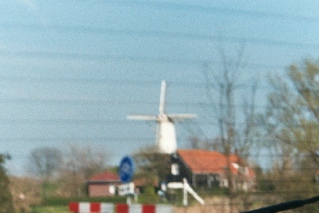 old windmill | 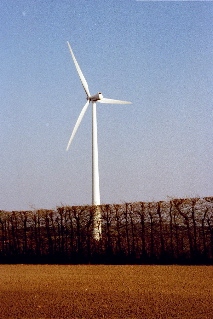 new windmill |
Eventually we were in Middelburg, which is quite pretty and has enough boat traffic that they have road signs in the canals. We passed very close to the old city but I didn't get a good photo of the cathedral.
The beach itself was vey nice. The North Sea was okay to wade in but far to cold for swimming, but I am told by August it reaches a respectable 22 degrees. So we spent most of our time sunbathing and enjoying the fresh air.
(to be continued...)
After a long hiatus I am back. Note to readers: I have put the entire travelogue online, with pictures that are only available in the online version. Just point your browser at mrob.com/kapellen
chapter 7
We walked back to the car, quite a long walk but pleasnt. There were so very few people at this beach, I was surprised, particularly considering that it was a weekend with very good weather and how cold it had been during the previous week.
Just as we were getting back on the highway for the trip home, we saw, next to the onramp a gathering assembly of the Benelux Cadillac club:
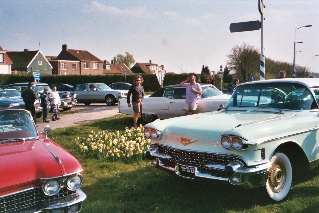
Cadillac Club
Mark is a bit of a Cadillac fan. (That's kind of like saying Mark is a bit of a Cher fan, which in turn is kind of like saying I am a bit of a math fan. See my webpage if you doubt me.) And what are the odds of us arriving by chance at this meeting just as it was starting? Very auspicious — so naturally we deemed it necessary to stop and look around.
For me, an American it seems a bit odd seeing these cars here in Europe and seeing the level of care, attention and devotion they are given. An old Cadillac is thoroughly impractical, and is street-legal only because there are special exemptions for antiques. There were plenty of newer (up to the late 70's) models here that would not have been considered very special in the U.S. — but here they would all stand out.
A Cadillac is also a bit unwieldy on the roads here. The roads are famously rather narrow in Europe. Bicycles and pedestrians are given more room and more respect. As a result, what seems like a normal speed in America seems a bit excessive in Europe and during my visit I was quite impressed by the speed and efficiency of the drivers. They are considerably more alert and seem somewhat more skilled at judging clearances and stopping distances and so on.
Because of the Cadillac stop and more road construction, we were home a bit late for our next engagement, hosting Marc's parents for dinner. On the way home we let them know we'd be late and Mark gave me some constructive feedback on the writing I've been doing.
The place where I live has a few things in common with Mark and Marc's neighborhood in Belgium, notably having been built from the grounds of a huge old estate. There are relics of old buildings, allées and other original plantings, identifiable architectural styles and so on. I showed some of this to Marc's parents using aerial photography of my home town from the Internet.
Monday, 14th April 2003
I've been interested in trying to find a shop like the Salvation Army store, which is where I buy my clothes at home. I found one such store today but their sign said maandag — gesloten (closed Mondays), another shop called "cash & carry" that specializes in used clothing appears to be gone, leaving only an old forgotten hand-painted sign on the side of the bulding. I spent quite a while searching for this, got hungry and bought something at a bakery "all by myself" (as I used to say when I was a child). It's not hard once you learn the numbers.
chapter 8
Tuesday, 15th April 2003
For a while I've been preparing to make a long solo bike trip; today is the day I've decided to do it. The weather is going to be perfect and I plan on going to the park in Holland we had been to a few times before.
I woke up real early, possibly excited about the trip but unable to sleep, and I decided to do a few things before leaving. I quietly made a few trips to the attic, carrying down some chairs that were wanted in place of some other chairs that were being used in the office. Then I emptied the dishwasher and helped Marc make breakfast. After breakfast Marc wanted some help setting up templates for invoices on the computer, so we spent a while on that. Their computer is identical to mine and I have been able to help them with things from time to time during the year that they've had it.
Having finished the chores and made my hosts thoroughly happy by my help, I was ready for the trip. A towel, extra clothes, food and water, tools to fix the bike if necessary, a camera and the headlight and generator which I would need to add to the bike in case I was late getting back home.
I started out towards Kalmthout, I needed to revisit the bike shop to get a tiny part to install the generator and also wanted to see some new places.
This page was written in the "embarrassingly readable" markup language RHTF, and was last updated on 2011 Jan 22.
 s.27
s.27